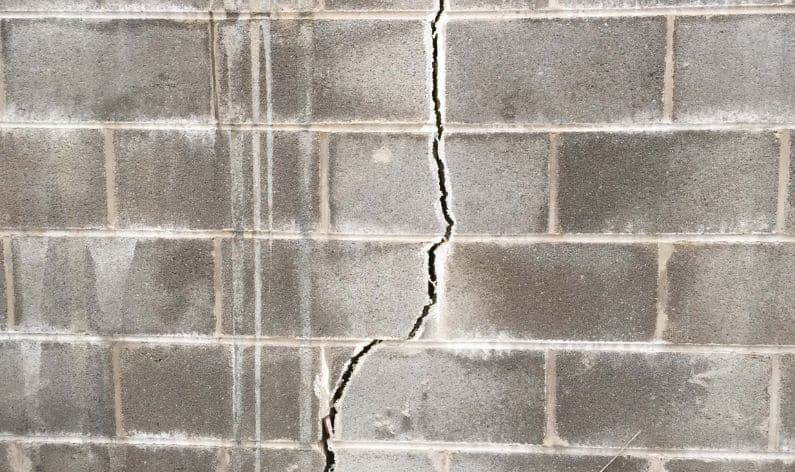Spotting a crack along your brick wall can feel a bit alarming. Where did it come from? Why is it there? Will this damage the home? All your concerns are completely understandable, as every homeowner wants their house to remain in perfect condition. Keep reading this article to learn more about what a cracked brick wall means and the types of cracks in the brick to look out for.
Why Does Brick Crack?
Brick may crack for a few reasons, but it’s rarely a good thing for your home. Some causes include:
- Natural elements
- Direct damage
- Heavy Construction
- Natural breakage
Noting the causes is important because you can better understand what areas of the home you may need to protect. Likewise, some causes of cracking, such as where you plant your trees, are preventable forms of damage. And although you can’t prevent everything, by knowing the causes, you can also look out for possible cracks after some of these events.
Natural Elements
Natural elements like humidity, earthquakes, floods, and more can damage your brick, as can times of extreme heat. When we plant trees too close to the home, their roots can grow beneath the foundation. In this instance, it can make the ground uneven and result in cracks along the brick.
Water Damage
Water needs to drain properly away from your home during storms. Therefore, gutters, plus forms of waterproofing like sump pumps and French drains, are key—they flush water away from your home. But sometimes we can’t see the cause as leaky pipes can also lead to water damage. Routinely inspect your home so that you can spot cracks early on.
Accidents and Construction
Brick may also crack due to direct damage. Meanwhile, indirect damage can occur if there’s heavy construction happening close to your home. This happens because the vibrations from the heavy machinery cause the ground to shake, which can lead to cracking along the brick.
Natural Breakage
We’ve talked about natural and unnatural problems that can lead to these cracks; however, brick may crack on its own over time. Homes are heavy, and no material is indestructible. Cracks may be the result of a brick naturally showing its age.
What Do These Cracks Mean?
A cracked brick wall means various things depending on the type of crack. Although this can often signify foundational issues, cracking could also be a sign of erosion, uneven settling, or hydrostatic pressure. You can often determine the meaning of the crack based on the type and location. And by noting the kind of crack, repair experts can more efficiently determine the cause and make the appropriate repairs to your home.
Is Cracking Natural?
Some degree of cracking may occur as the home and material age. For example, small or hairline cracks in your brick can occur naturally and shouldn’t worry you. However, you should keep an eye on these cracks and call an expert if they grow.
Types of Cracks in Brick
Understanding the various types of cracks is vital and helps you understand what your home is “telling” you. This also makes it easier for you to explain the problem to an expert and seek repairs. The most common types of cracks are:
- Horizontal cracks
- Vertical cracks
- Stair step cracks
This isn’t a type of repair you want to wait around for—it’s unsightly, and ignoring it may even lead to further damage to your home. Water, insects, and rodents can utilize these cracks to sneak their way into your house and make it their home too! This can lead to further damage to your property and costly repair fees.
Horizontal Cracks
Most of the time, horizontal cracks are a sign of problems with the soil surrounding your home’s foundation. These cracks appear as the house settles with time. Everything begins to break down, including concrete and brick.
Horizontal cracks may also occur if the soil under the foundation can no longer properly support it or if it pushes too hard against the brick. High-pressure build-up eventually leads to unsightly cracks in your home. Ignoring this red flag can lead to worse damage as the weakened walls begin to bow and ultimately break. In turn, this could lead to severe structural issues in your home.
Vertical Cracks
A vertical crack signifies a problem with your foundation. It can also suggest that the ground beneath your home has shifted. Weather conditions such as extreme heat can also cause the brick to crack as it expands and shrinks according to the temperature outside.
If you notice vertical cracks in your brick, it’s best to check the foundation for the same type of damage.
Stair Step Cracks
Typically, this type of crack occurs due to uneven settling, in which part of the foundation may settle while the rest doesn’t. These cracks are easy to spot as they look like a staircase that descends diagonally. They drop at an angle along the mortar of the brick, which is why it looks like stairs. You’ll want to contact a foundation expert who can prevent further damage to the brick and the rest of your home.
Tips for Repairing Cracks
Although you can attempt repairing this yourself, it’s best left to the professionals. An expert will fix the crack and investigate what’s causing it so that you can address the underlying issue. After all, simply patching the crack will not solve the problem. If something is wrong with the foundation, you may begin noticing issues with other areas of the home, such as bowing walls or sloping floors.
Contact Our Professional Team
The Crack Guys will determine the reason for cracks in your foundation so that we can solve the real problem before repairing the cracks in brick walls in your home. We have a combined 20 years of service experience and have the expertise to fix your home, so you have nothing to worry about. Get cracks in your brick repaired as soon as possible to prevent additional damage to your beautiful home.




